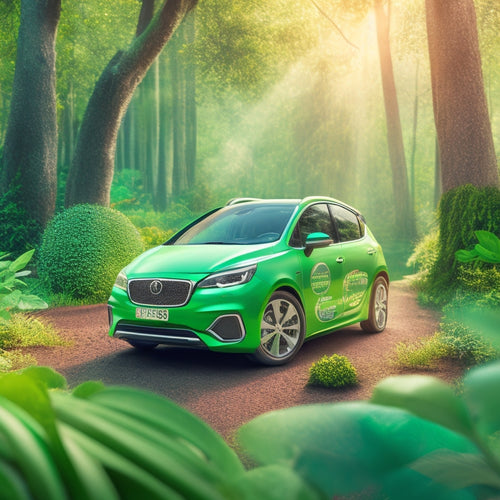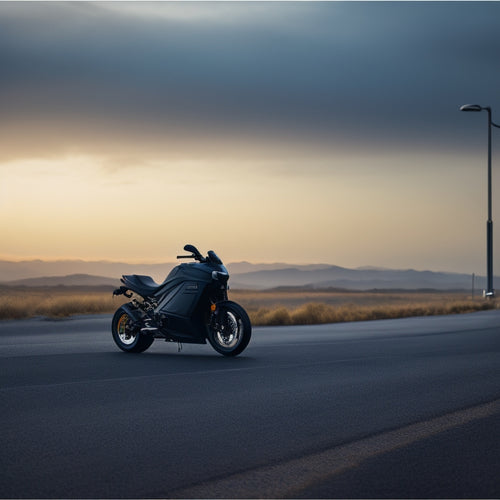
Fixing Common Solar Panel Problems on Your Vehicle
Share
When you notice your vehicle's solar panels aren't performing as expected, it is crucial to identify and fix common issues quickly. Overheating, low power output, and faulty connections are typical problems that can reduce performance and lifespan. Inspect your panels for signs of wear, corrosion, or damage, and guarantee secure connections. Optimize panel tilt and orientation to boost power output. If you suspect corrosion or rust damage, apply rust-inhibiting coatings and use corrosion-resistant components. By addressing these issues, you'll be on your way to maximizing your solar panel's energy output - and there's more to explore to get the most out of your system.
Key Takeaways
• Inspect solar panels regularly to identify and address overheating, corrosion, and loose connections that can reduce energy output on your vehicle.
• Ensure proper installation and secure connections to prevent energy loss and safety hazards while on the move.
• Clean solar panels regularly to remove dust and debris that can reduce energy output, using soft-bristled brush or microfiber cloth and mild soap and water.
• Monitor inverter and battery charging performance to identify unusual noises, faulty readings, or voltage fluctuations that can indicate underlying issues.
• Implement preventative measures such as rust-inhibiting coatings, corrosion-resistant components, and dust protection plans to extend the lifespan of your solar panels.
Overheating Solar Panels on Cars
When you're depending on solar power to keep your vehicle's batteries charged, overheating solar panels can be a major setback, especially during long road trips or in hot climates. It's like having a sun-kissed souvenir, but not the best kind. Overheating reduces the panel's efficiency, leading to reduced power output and potentially damaging the system.
Don't let your solar panels turn into hot messes! Effective thermal management is key to preventing overheating. You can improve heat dissipation by guaranteeing good airflow around the panels. Make sure to install them at an angle, allowing air to circulate underneath. You can also consider adding a thermal gap or a heat sink to enhance heat dissipation.
Additionally, choose solar panels with built-in thermal management features, such as specialized coatings or heat-resistant materials. By keeping your solar panels cool, you'll ensure top-notch performance and extend their lifespan.
Now, go ahead and soak up that sunshine – your solar panels will thank you!
Low Power Output Issues
About 20% of solar panel owners report low power output issues, which can be a frustrating problem to diagnose and fix, especially when you're relying on your solar panels to keep your vehicle's batteries charged. But don't worry, we're here to assist you.
First, check for shading effects. Yes, you read that right - shading effects! Even a tiny bit of shade can reduce your solar panel's power output. Take a closer look at your panel's installation and make sure there aren't any sneaky shadows from nearby objects. You might need to adjust the panel's angle or even trim some nearby branches to let the sunshine in.
Speaking of angles, have you checked your panel's tilt and orientation? Make sure it's at the best angle to catch those precious sunrays. If you're not sure, consult your solar panel manual or do some quick research online. A slight adjustment could make all the difference in your power output.
Faulty Solar Panel Connections
You've checked for shading effects and optimized your panel's angle and orientation, but your solar panel's power output still seems off, which leads you to suspect faulty connections might be the culprit. Don't worry, it's an easy fix! Corroded or loose connections can cause significant voltage drops, reducing your panel's efficiency.
Inspect your connections carefully, looking for signs of wear, corrosion, or damage. Check the connection types, ensuring they're secure and not overheating.
For example, if you're using MC4 connectors, make sure they're tightened properly. A loose connection can cause a voltage drop of up to 1 volt, impacting your panel's performance to a notable extent.
When checking connections, use a multimeter to measure the voltage at each connection point. This will help you identify any voltage drops and pinpoint the faulty connection.
Once you've identified the issue, simply clean or replace the faulty connection, and you'll be generating power at efficient levels in no time. Remember, a well-maintained connection is key to maximizing your solar panel's output.
Cracked or Broken Panels
When dealing with cracked or broken solar panels on your vehicle, it's crucial to identify the root cause of the damage.
You'll need to inspect the panel's surface for signs of impact, such as rock chips or hail damage, or check for manufacturing defects that may have contributed to the crack.
Causes of Cracks
Cracks in your vehicle's solar panels often stem from excessive flexing, which occurs when the panel isn't properly secured to the roof or hood of your vehicle. This constant bending and flexing can cause the panel to weaken, leading to cracks and breakage.
But that's not the only culprit. Manufacturing defects can also play a role in cracked or broken panels. Maybe the panel wasn't built to withstand the rigors of the road, or perhaps it was damaged during shipping. Either way, a defective panel is more prone to cracking under stress.
And speaking of stress, environmental stress can also contribute to cracked panels. Extreme temperatures, hail, and other environmental factors can cause the panel to expand and contract, leading to cracks over time.
Repair or Replacement
Frequently, solar panels with minor cracks can be repaired, but severely damaged or broken panels often require replacement to ensure maximum energy output. If you're dealing with a cracked or broken panel, it's important to evaluate the damage and decide whether repair or replacement is the better option.
A good rule of thumb is to take into account the cost of repair versus replacement. If the repair cost is close to 50% of the panel's original price, it might be more cost-effective to opt for a new panel. Additionally, if you're planning to upgrade your solar panel system, now might be the perfect time to explore panel upgrades that offer improved efficiency or durability.
When conducting a cost analysis, don't forget to factor in the potential energy losses due to a damaged panel and the potential gain from a more efficient replacement. Remember, a well-maintained solar panel system is vital for maximizing your energy output and reducing your carbon footprint.
Corrosion and Rust Damage
Rust and corrosion can silently sabotage your solar panel system, causing irreversible damage to the metal components and compromising the entire setup's efficiency. You mightn't notice it at first, but corrosion can creep up on you, reducing your solar panel's performance and ultimately shortening its lifespan.
To avoid this, it's vital to implement rust prevention measures, particularly if you're driving near coastal areas where saltwater and moisture accelerate corrosion. For coastal protection, apply a rust-inhibiting coating to your solar panel's metal components, such as the frame, mounting brackets, and connectors. You can also use stainless steel or anodized aluminum components, which are more resistant to corrosion.
Regularly inspect your solar panel system for signs of corrosion, and address any issues promptly. Don't let rust and corrosion quietly destroy your solar panel system - take proactive steps to prevent damage and ensure your setup continues to generate power efficiently. By being vigilant, you'll save yourself from costly repairs and maintain your vehicle's solar panel system in top condition.
Loose or Faulty Wiring
At least half of all solar panel system failures can be attributed to loose or faulty wiring, which can lead to reduced power output, electrical shocks, and even fires. You don't want your solar panel system to turn into a fire hazard, do you? To avoid this, you need to keep an eye on your wiring. Check for any signs of wear, corrosion, or damage. Make sure all connections are secure and not loose. You don't want any electrical shock surprises!
Proper wire management is key to preventing these issues. Keep your wires organized, labeled, and protected from the elements. Use wire ties, cable clips, or wire loom to keep them tidy. Also, ensure that your wires are rated for outdoor use and can withstand the elements. If you're not sure what you're doing, consider consulting a professional.
Inverter Malfunction Signs
While ensuring your wiring is secure, you'll also want to monitor your inverter's performance, as it's responsible for converting DC power from your solar panels into usable AC power for your vehicle, and any malfunction can greatly impact your energy output. A malfunctioning inverter can be a real power-sucker (pun intended), so it's essential to recognize the signs of trouble.
One common indicator of an inverter malfunction is unusual inverter noise. If you notice strange humming, whirring, or buzzing sounds coming from your inverter, it may be a sign that something's amiss.
Another red flag is faulty readings on your inverter's display. If the numbers just don't add up or seem way off, it's time to investigate.
Other signs of trouble include overheating, burning smells, or a complete loss of power output. Don't ignore these warning signs – address them promptly to avoid further damage to your system.
Battery Charging Problems
One of the most frustrating issues you'll encounter with your vehicle's solar panel system is when your batteries aren't charging properly. It's like having a gas guzzler without the gas - what's the point, right?
But don't worry, we're here to help. Battery charging problems can stem from voltage fluctuations, which can be caused by a faulty charge controller or a malfunctioning solar panel.
When your batteries aren't charging, it's like they're stuck in a never-ending cycle of disappointment. To break this cycle, you'll need to identify the root cause of the issue. Check your charge controller settings to make sure they're configured correctly.
Also, inspect your solar panels for any signs of damage or debris that might be affecting their performance. If you're still having trouble, it might be time to replace your batteries or upgrade your charge controller.
Cleaning and Maintenance Tips
Regular cleaning and maintenance are crucial to guaranteeing your vehicle's solar panel system operates at peak efficiency, and you can extend its lifespan by following a few simple tips. First, inspect your panels regularly to identify any dust or debris buildup. A clean panel is a happy panel, after all! Use a soft-bristled brush or a microfiber cloth to gently sweep away dirt and dust, taking care not to scratch the surface. For tougher grime, mix a solution of mild soap and water, but avoid using harsh chemicals or abrasive materials that can damage the panel's coating.
To ensure top-notch performance, consider implementing a dust protection plan, such as installing a protective film or applying a dust-repelling coating. During your panel inspection, keep an eye out for signs of wear and tear, like loose connections or corrosion. Tighten any loose screws or bolts, and replace any damaged components promptly.
Frequently Asked Questions
Can I Install Solar Panels on a Fiberglass Vehicle Roof?
'You can install solar panels on a fiberglass vehicle roof, but first, make sure the surface is properly prepared with a strong bond-promoting primer, and consider roof reinforcement to handle the added weight.'
Do Solar Panels Drain the Vehicle's Battery at Night?
"At night, you're wondering if your solar panels will drain your vehicle's battery. Relax, most modern systems come with a built-in Battery Saver that prevents nighttime charging, ensuring your battery stays healthy and happy!"
Are Solar Panels on Cars Affected by Shade or Trees?
When you park under trees, you'll notice tree coverage affects your solar panels' performance, as shade patterns can reduce energy output by up to 20% - so, choose your parking spot wisely!
Can I Walk on My Vehicle's Solar Panels in an Emergency?
"In an emergency, you might need to walk on your vehicle's solar panels, but be aware that your weight distribution could crack or shatter them; prioritize emergency preparedness, not your sneakers' grip on fragile tech."
Do Solar Panels Void My Vehicle's Warranty?
"Hey there, solar enthusiast! You're wondering if solar panels void your vehicle's warranty? Not necessarily! Check your manufacturer's policy; some, like Ford, explicitly exclude solar panel installations from warranty nullification, while others might have specific requirements or restrictions."
Related Posts
-

Why Go Green With Automotive Products Online?
By switching to eco-friendly automotive products online, you're taking a significant step towards reducing your carbo...
-

Why Electric Motorcycles Fail at Long-Distance Touring
You're likely familiar with the excitement of hitting the open road on an electric motorcycle, but you're also smart ...
-

What Makes a Road Bike-Friendly by Design?
As you plan and design roads, incorporating features like dedicated bike lanes, smooth surfaces, and traffic calming ...


